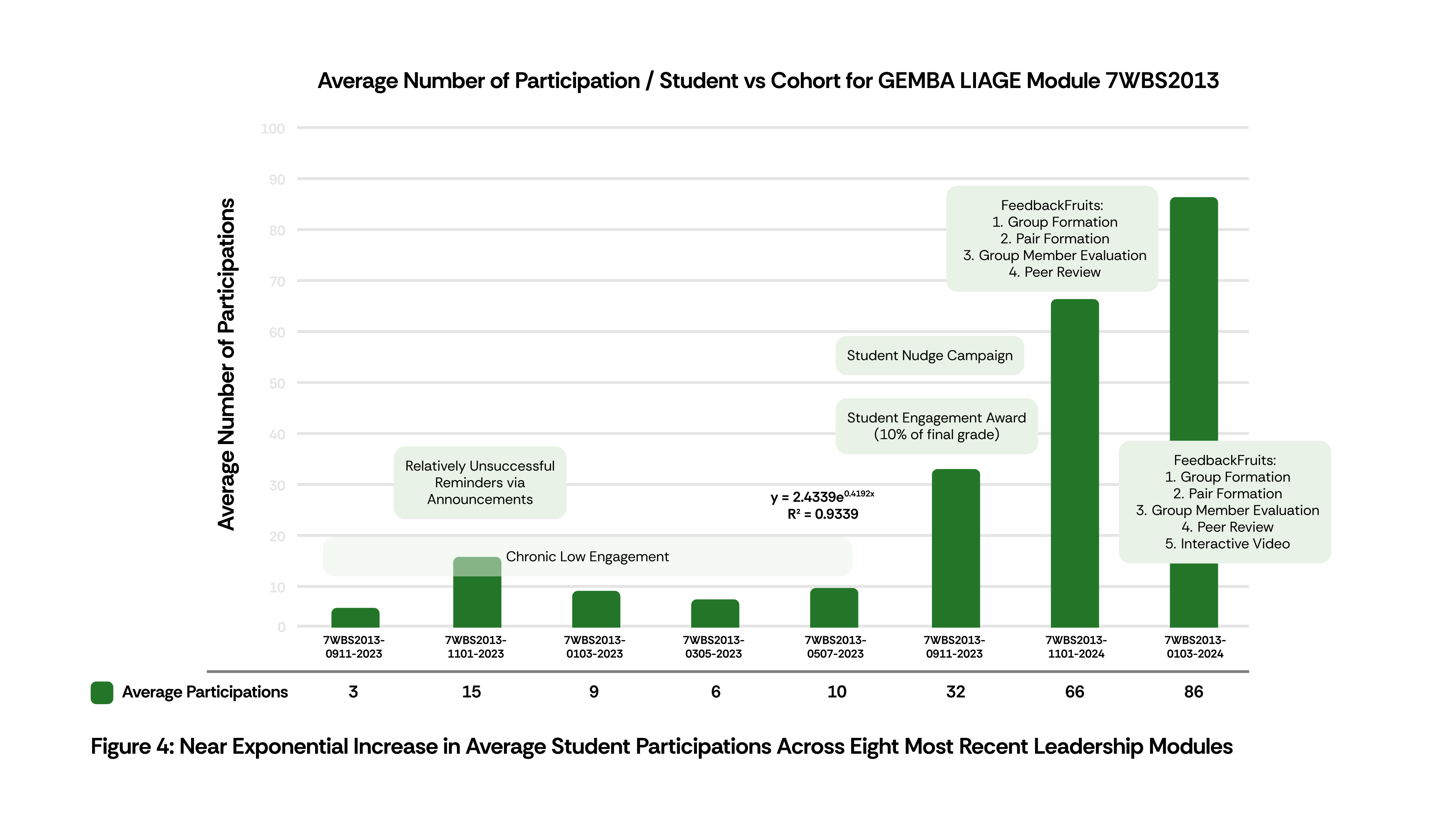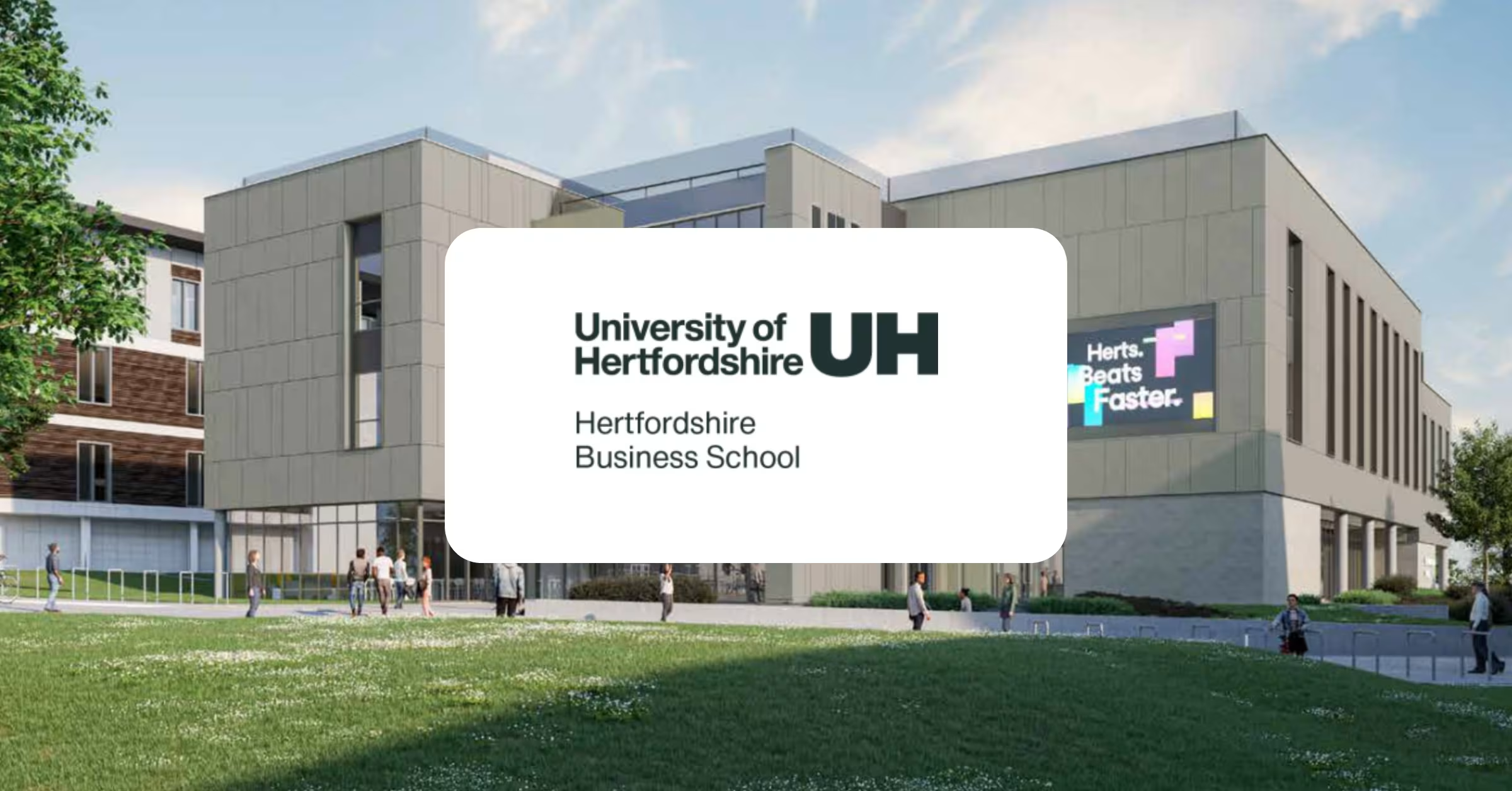Enhancing student engagement in asynchronous digital education for Hertfordshire Business School
Hertfordshire Business School (HBS), part of the University of Hertfordshire, is one of the UK’s largest business schools, serving 7,000 students on campus and 4,000 overseas. Known for digital innovation and applied learning, HBS Online extends this mission globally through flexible, career-aligned programmes such as the Global Executive MBA (GEMBA).
Delivered fully online and asynchronously, GEMBA enables mid-career professionals to advance their education while continuing to work. To deliver high-quality, engaging online learning, HBS partnered with:
- FeedbackFruits – interactive solutions for peer learning, collaboration, and engagement analytics.
- Skilled Education – industry leaders in developing, marketing and supporting high-quality online courses and degrees.
The Leadership in a Global Environment (LIAGE) module is a core component of the Global Executive MBA at Hertfordshire Business School. It equips learners to navigate the challenges of leading in today’s complex, interconnected world, fostering critical thinking, global collaboration, and the application of strategic leadership in real-world contexts.
Hertfordshire Business School (HBS), part of the University of Hertfordshire, is one of the UK’s largest business schools, serving 7,000 students on campus and 4,000 overseas. Known for digital innovation and applied learning, HBS Online extends this mission globally through flexible, career-aligned programmes such as the Global Executive MBA (GEMBA).
Delivered fully online and asynchronously, GEMBA enables mid-career professionals to advance their education while continuing to work. To deliver high-quality, engaging online learning, HBS partnered with:
- FeedbackFruits – interactive solutions for peer learning, collaboration, and engagement analytics.
- Skilled Education – industry leaders in developing, marketing and supporting high-quality online courses and degrees.
The Leadership in a Global Environment (LIAGE) module is a core component of the Global Executive MBA at Hertfordshire Business School. It equips learners to navigate the challenges of leading in today’s complex, interconnected world, fostering critical thinking, global collaboration, and the application of strategic leadership in real-world contexts.
Context
Hertfordshire Business School (HBS) is committed to student success, digital innovation, and inclusive learning. In line with the University’s 2025–2030 Strategy, HBS sought to address the persistent challenge of sustaining engagement in asynchronous online learning.
This case is based on the Hertfordshire Excellence in Practice Case Study: Rising to the Challenge of MBA Student Engagement in Asynchronous Digital Education (Hertfordshire Business School, FeedbackFruits, and Skilled Education, March 10, 2025). You can learn more about the full research in that case study, here, we focus specifically on our collaboration as FeedbackFruits.



The challenge
The Leadership in a Global Environment (LIAGE) module, a core element of the GEMBA, was designed to be delivered fully online and asynchronously to accommodate students balancing professional and personal commitments. However, early cohorts recorded low levels of participation (fewer than 10 meaningful interactions per student on average), limited peer collaboration, and uneven learning outcomes.
Faculty interventions such as reminders and announcements proved labour-intensive and had limited effect. A structured redesign was therefore needed to embed engagement into the learning process itself.
The intervention
Working with Skilled Education and FeedbackFruits, HBS developed a multi-layered engagement strategy:
- Engagement-based assessment: introducing a Student Engagement Award (10% of the final grade) linked to participation in discussions, peer review, and collaborative tasks within action learning sets.
- Data-informed nudging: using learning analytics to group students into quartiles and provide tailored communications about the historical association between engagement and performance.
- Interactive learning design: embedding peer review, group evaluation, interactive video, and reflective writing within a Guided Learner Journey structured around Bloom’s Taxonomy.
- Faculty development: running drop-in sessions and workshops to support staff in integrating these approaches.
FeedbackFruits solutions provided the technical functionality for structured peer learning, engagement tracking, and data visibility for staff and students. Skilled Education ensured alignment with institutional strategy and student success goals.
The impact
Across eight recent module iterations:
- Average student interactions rose from 3–10 per student to 86.
- Statistical analysis indicated that engagement explained around a third of the variance in grades. Students engaging more than 20 times tended to achieve significantly higher marks than those with fewer than 10 interactions.
- Retention improvements are projected to be significant, supported by enhanced engagement with online materials.
Qualitative feedback from students and staff highlighted stronger collaboration, improved digital teamwork skills, and more consistent participation. External examiners also noted students’ improved digital leadership and collaboration skills, aligning with programme outcomes.
“Early scepticism surrounded the effectiveness of engagement-based grading, but results demonstrated a clear impact… participation increased sixfold”
EFMD. (2024). Empowering Engagement: Showcasing Online Collaboration [video]. EFMD Global.
“Students from the modules have demonstrated improved collaboration and digital teamwork skills, aligning with expectations for leadership in a global environment.”
Internal moderators & external examiners (case study, 2024)

Reflections and next steps
While engagement is only one of many factors influencing student outcomes, these findings suggest that structured, data-driven approaches can make a measurable difference. Importantly, the interventions combined assessment design, behavioural insights, and digital tools; no single element alone would have sufficed.
HBS is now extending engagement-based approaches across further modules, supported by faculty workshops and iterative analysis. Future work will continue to refine personalised nudges, evaluate long-term retention effects, and embed inclusive design principles to ensure all learners benefit.
Activity
- Course: Leadership in a Global Environment (MBA)
- Objective: Increase engagement, collaboration, and student success in a flexible, asynchronous format
- Solutions used: Peer Review, Group Member Evaluation, Interactive Video, Interactive Document, Nudging and Analytics
Activity design
- Students began with theoretical readings (Interactive Document), followed by reflective writing.
- They submitted assignments and exchanged feedback using Peer Review.
- Group collaboration was supported by Group Member Evaluation, ensuring equitable contribution.
- Interactive video cases challenged students to apply concepts to real-world leadership scenarios.
- Throughout the module, analytics and nudges gave staff real-time insights and enabled timely interventions.
This initiative demonstrates how a research-informed, partnership-based approach can address a significant challenge in digital higher education. By aligning pedagogy, analytics, and technology with institutional strategy, HBS has created a replicable model for enhancing engagement in asynchronous learning.
FeedbackFruits and Skilled Education contributed important enabling tools and expertise, further empowering HBS’s efforts to rise to the challenge of enhancing student engagement.





.avif)
.avif)



